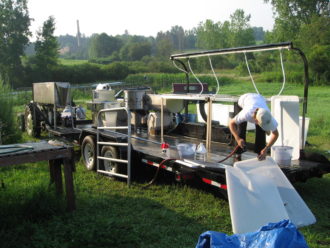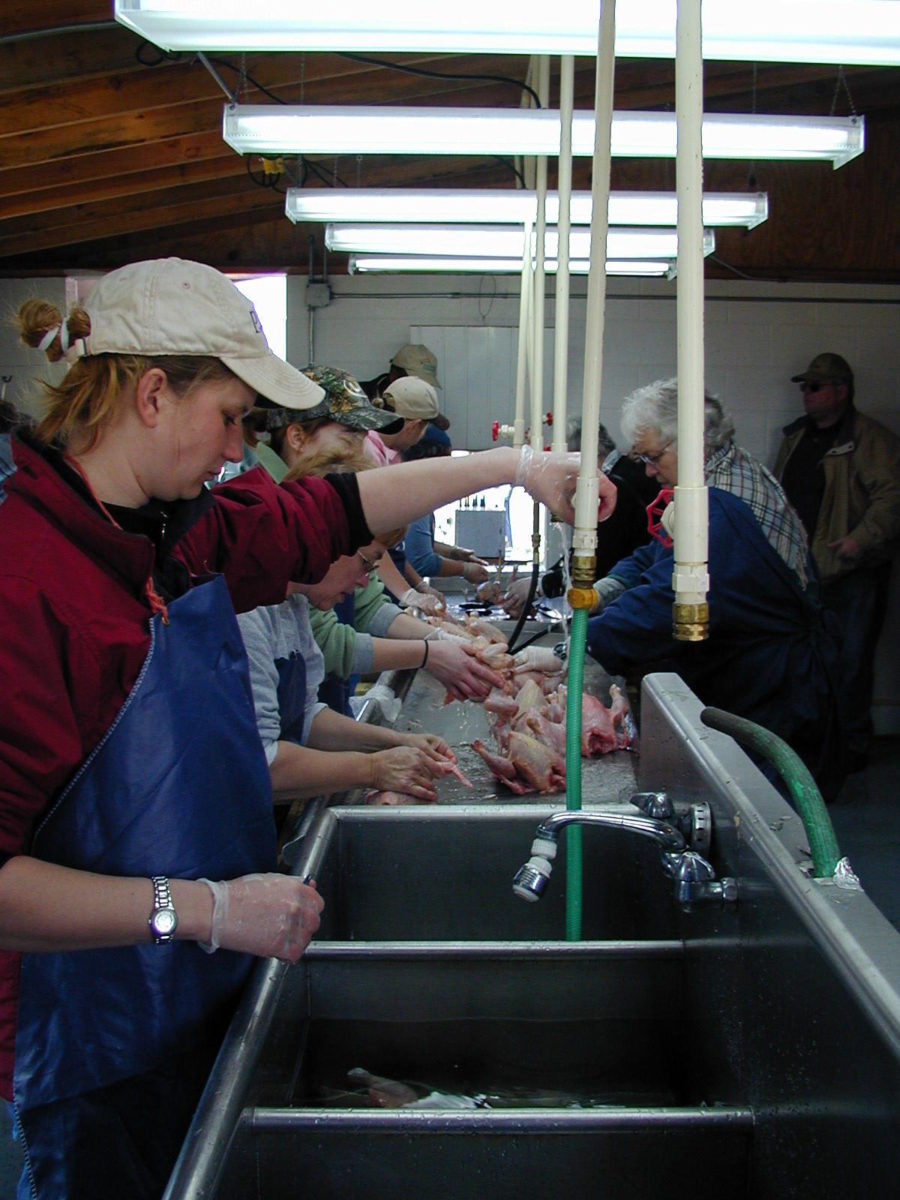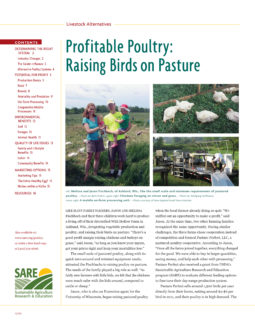On-Farm Processing

Consider slaughtering and processing arrangements early on, because commercial processors that handle relatively small numbers of birds are hard to find. If you want to sell through grocery stores or to restaurants, you typically must process in a government-approved facility, but those who sell directly to the public may be able to slaughter on farm under a federal exemption.
Tom Delehanty, the New Mexico farmer, cautions that a fledgling poultry producer be sure to have lots of help with strong stomachs if they choose to process on the farm.
“You can’t do it alone, and if any members of your family or people you hire are going to have a problem with the pace of the work or with killing, plucking and gutting chickens, you’d better know about it before you ever get started in the business,” he said.
For a typical on-farm dressing operation, you will need:
- kill cones;
- a scalder (to loosen feathers), purchased or constructed;
- a plucker to remove feathers;
- stainless-steel tables for eviscerating;
- running water for washing;
- plastic tubs or a stainless-steel tank to chill carcasses prior to packaging; and
- supplies such as sharp knives, ice, bags and
- gloves for sanitation.
Joel Salatin and his family continue to process up to 20,000 broilers each year on farm, a practice that has worked well for other farmers as well. Using equipment similar to what is listed above, Salatin works on a concrete slab beneath a simple corrugated fiberglass roof. Salatin’s waste water is then pumped to the farm’s vineyards for nutrient-rich irrigation.
“My family and I have worked out the best way for us to do this, and we’ve got it down to a science,” he said.
The most important judges of the quality of his dressing operation, Salatin said, are those who help him do the processing, and his customers. “Our customers pick up their orders from a site right next to where we do the processing, so they can see for themselves how clean it is,” he said. “If they don’t like what they see, they won’t come back.”
Disposal of Solid Wastes

Salatin composts the feathers, guts, heads, feet and blood of the broilers he processes. He admits it takes some skill and experience, but said he is able to manage his compost piles so that odors and pests aren’t a problem, even at the height of summer.
Oregon farmer Robert Plamondon, who raises about 800 free-range layers and 2,000 broilers outside the town of Blodgett, does the same, sprinkling hydrated lime on his compost heap after each addition to both reduce odors from the decaying organic matter and to repel pests such as flies, raccoons and even other chickens. Salatin incorporates wood ash, as well as lime. Both Salatin and Plamondon use the compost to amend the soil in their garden plots, as well as to help fertilize their pastures. Spreading the compost on the farm makes sure that the money spent on feed stays on the farm and ultimately does not go to waste.
Other producers who live close to metropolitan areas with upscale and ethnic restaurants can sell feet and heads to chefs who use them to make soup stocks. Some resourceful producers have found that by grinding the poultry heads, backs, feet and organs, they can turn low-value, or typically wasted, parts of the chicken into a highly demanded, raw pet food product that can be sold for a good profit to pet lovers.
In Kentucky, Poultry Growers Share Mobile Processor to Comply with Restrictive Laws
In Kentucky, a group of farmers, consumers, nonprofit organizations, university scientists, and health and agriculture department officials have jointly constructed a mobile processing unit—about the size of a large horse trailer—that can be hauled by truck to different locations. It contains the scalding, plucking, washing and packaging equipment each farm family needs to process broilers and turkeys.
One of the key players in the coalition is Heifer International, a nonprofit organization that helps farmers with limited resources launch pastured-poultry and other enterprises. Heifer applied for SARE funds, which, combined with major support from the Kentucky Department of Agriculture, financed the $75,000 mobile unit. Participating farmers helped design the unit, and Steve Muntz, coordinator of the poultry project and Heifer's then-Appalachia program manager, said they are satisfied with their initial experiences.
“There was no alternative for the farmers,” Muntz said. “There is not a single federally inspected poultry processing plant in the state that will take birds from an independent producer, and selling live birds to individuals is the only other way, given the state restrictions.”
The USDA has exempted the unit from federal inspection, and the state has licensed it for both poultry and shrimp processing. Birds processed in the unit, the only legal method for independent Kentucky farmers to sell processed poultry, can be sold anywhere in the state.
The unit, which must be paired with a docking station equipped with potable water, electric and sewer connections, is located in Frankfort. To reach greater numbers of farmers and to minimize the per-station expense (estimated at $4,000 to $5,000), organizers expect to see another station constructed in eastern Kentucky.
“As agriculture has gotten bigger and bigger in this country, the doors to the marketplace have been closed to small farmers,” Muntz said. “The unit is one key available to Kentucky farmers to unlock those doors.”
Cooperative Mobile Processors
To provide farmers with affordable alternatives to on-farm poultry processing, groups around the country are bringing slaughtering to the farm. Mobile poultry processing units (MPPUs or MPUs) are becoming a popular solution to the nationwide lack of poultry processors that work with independent farmers.
Twelve farm families in Michigan collaborated on a mobile processing unit in a project partially supported by SARE. The unit, built in 1999, cost about $20,000 and called for about 360 hours of labor.
Rick Meisterheim, of Michigan’s nonprofit Wagbo Peace Center, coordinated the project. He reports that the 12 producers contributed together about $11,000 toward the cost of the unit, and agreed to a yearly membership fee of $25 and a 25-cent charge per bird processed.
For the Fischbachs in Wisconsin, “Processing was a problem from the start,” said Jason, “and it always seemed to be the bottleneck.” The family teamed up with the other members of the Pasture Perfect Co-Op to build a mobile processing unit. Processing on farm, the net gain per chicken triples compared to hauling to a state-licensed processing center. “Once we joined together, everything changed for the better.”
With three other Nebraska growers, David Bosle bought a mobile processing trailer in a cooperative effort. The farmers and others in the community share a trailer equipped with killing cones, a scalder, a feather picker, a scale and an evisceration area. The processor, purchased with help from Nebraska’s Center for Rural Affairs, which received a SARE grant, allows the four farmers to share the cost of processing. They also rent out the mobile unit to other farmers or, at a discount, to community groups like 4-H.
Processing Regulations
Small, independent producers who want to process poultry themselves and sell directly to customers can take advantage of provisions in federal laws that exempt them from inspection. Some states use the federal laws while others have their own laws.
Fewer than 1,000 broilers: In many states, if you do not sell meat across state lines and you do not market poultry from other farms, you can raise and process up to 1,000 birds a year and be exempt from federal inspection rules. Check with officials in your state department of agriculture or health before processing to clarify the exemptions allowed.
Between 1,000 and 20,000 broilers: If the processing facility used and practices employed meet federal sanitation standards and you do not sell meat across state lines, you can be exempt from federal inspection rules, although most states (such as Kansas) may impose stricter rules. Check with officials in your state department of agriculture or health before processing to clarify the exemptions allowed.
Direct marketing rules for fresh eggs also vary by state.
Labeling claims are tightly regulated. Contact USDA’s Food Safety Inspection Service at (800) 233-3935 or online at ASK FSIS.
For more information, consult the Poultry Processing Regulations and Exemptions, a resource offered by the Niche Meat Processor Assistance Network.
